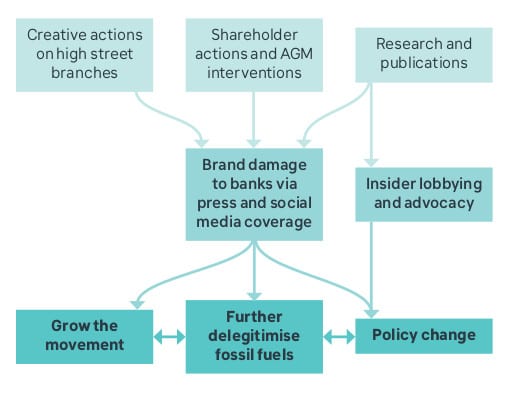350
End Fossil Finance
Challenging the banks driving the climate crisis
It’s simple — to prevent devastating climate breakdown, we have to end all finance to fossil fuels.
To operate, all fossil fuels projects need money. Through loans, underwriting and investments, public and private banks pour hundreds of billions of euros each year into the dirty fossil industry.
Share on Twitter
Share on Facebook
Without this money, there’d be very few new fossil fuels projects. That’s why we need to disrupt fossil finance – and go after banks.
Finance is the foundation of the fossil fuel industry, that is driving climate breakdown and threatening communities around the world.
Finance also builds the future. The investments and loans of today establish the energy sources of tomorrow. Fossil finance is now propping up fossil companies, and enabling them to keep adding new unnecessary fossil fuel projects. Instead, this money could finance the rapid, broad transition to a 100% renewable energy system we urgently need.
To have any chance of avoiding runaway climate breakdown, no new fossil fuel project can be allowed to go ahead. It’s our chance to confront the climate crisis at its root, and achieve systemic change.
It’s time to end fossil fuel finance. Learn how below, or read more about our plan and call to action.
The Plan
Research shows that social movements win when a relatively small percentage of the population gets actively organised on a regular basis. To confront the climate crisis, we need hundreds of new climate defenders with the organising skills needed to effectively disrupt key institutions driving the crisis.
So what’s our plan? We’re going to confront the financial sector.
Why? Finance is the foundation of the fossil fuel industry. Money from banks, through loans, underwriting and investments, allows companies to expand their work and build more climate-wrecking projects.
How do we cut off this finance? Through sustained public organising and people power. Together, we will show banks that their current business model is unacceptable.

Young people and frontline communities are already leading the way. Through their organising and disobedient tactics, they have been hugely successful in igniting public consciousness and mainstreaming the urgent need for climate action back into general public discourse.
We can answer the call to climate action by challenging the primary pillar that props up fossil fuel extraction: the banks.
Our Demands
- Non-proliferation of fossil fuels: an immediate ban on any new permits for new fossil fuel projects and expansion of existing projects (including exploration, extraction, transportation and power).
- Cut off the money flows: a rapid end to public and private financial flows, both to and from fossil fuel companies and projects. That means no subsidies, investments, loans, export credits, underwriting, aid, or tax breaks for fossil fuel projects anywhere
The Steps
To build enough power to enact these demands, we will be focusing on three core moments:
- Summer 2019 – building momentum: mass trainings and collective actions across Europe,
- Autumn 2019 – mass mobilisations to disrupt key political, financial and corporate targets.
- 2020 We Rise – trainings, mobilisations and mass direct actions at key fossil fuel infrastructure sites and points of political and financial power.
Resources to Help You
To really challenge the financial industry, we need powerful campaigns. Here’s a set of resources to help you assemble healthy groups, craft powerful actions, and achieve meaningful change.
Action Planning Resources
Fossil Finance
Media and Messaging
Digital Campaigning
Equity and Climate Justice
Facilitating Meetings and Discussions
STRUGGLES IN FOCUS: Learn about how banks are financing fossil fuels – and which are some of the key ongoing struggles across the world.
Trans-Adriatic Pipeline, Italy
For over two years, local communities in the southern Italian region of Puglia have been resisting the establishment of the Trans Adriatic Pipeline (TAP), a massive fossil gas pipeline and terminal. The infrastructure threatens their ancient olive farms, water sources, cultural heritage sites and stunning coastline. The TAP project is financed by the European Investment Bank, the European Bank for Reconstruction and Development, various export credit agencies, and multiple commercial banks.
Rampal, Bangladesh
Rampal is a 1,320-MW power plant being built without local consent, only 15km from the vulnerable UNESCO World Heritage area of the Sundarbans mangrove forest. Many have already been forcefully displaced by the project, and over two million Bangladeshis and Indians depend on the Sundarbans for food, water and income. The project backers have previously included asset managers BlackRock and the International Finance Corporation (IFC).
End fossil finance!
It’s simple — to prevent devastating climate breakdown, we have to end all finance to fossil fuels.
Public and private banks pour hundreds of billions of euros each year into the climate-wrecking fossil industry. We need to urgently work together to stop fossil finance through sustained public organising and people power.